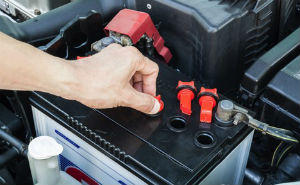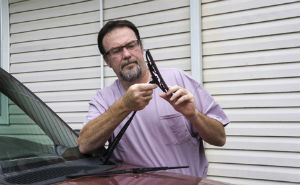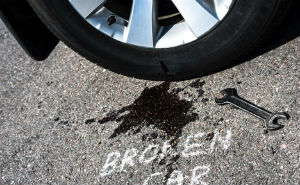It’s a worst-case scenario kind of moment. You’re on the road to a relative’s house for the holidays, snow on the roads, when suddenly something goes wrong with your car. Your brakes give out, your battery dies, and you run out of antifreeze. The reality is, there’s always a chance something could go wrong with your car. But that doesn’t mean you can’t take steps to protect yourself.
Before you hit the road this holiday season, take a moment to check for these often overlooked car troubles. It’s always better to be safe than sorry when it comes to preventative auto care.
Know Your Battery Basics

When checking your battery you should also check its physical condition – the terminals and cables that connect everything. If you see rusting, cracks, or other exterior flaws, you may need some replacement parts. Always check with a professional if you are concerned about the state of your battery. Physical damage to the battery may actually prove more dangerous to your car and your safety than charge issues.
Care For Your Wipers

Not sure if your windshield wipers are up for the job? According to Consumer Reports, even the highest quality windshield wipers should be replaced about every six months. If you can’t remember the last time you swapped yours out, grab some new ones before you depart. You’ll be grateful when those new blades cut straight through the snow on your windshield.
Don’t Overlook Leaks

One of the most common and overlooked causes of internal engine leaks are minor accidents. What you may see as a simple fender bender may cause a small crack in already worn tubing. Cold weather can also cause tubing to become more brittle, especially as it ages, as well as due to effects of frequent temperature changes as the engine heats up and then cools down in rapid succession.
When you drop in for your pre-travel oil change, ask your technician to take a look at your tubing to make sure there aren’t any leaks inside your engine. An encounter between two fluids that aren’t supposed to mix within the volatile engine environment may just cause a malfunction, but other combinations may result in fires or explosions. Don’t take that risk.
Check Your Equipment
There are lots of moving parts to car operation, and not all of them are a physical part of the vehicle. So while you should be checking your windshield wipers and air filter before you leave, don’t overlook supplementary items, like your car jack.
You should always check your car jack to make sure it’s working in the event you need to change a tire while on the road. And it goes without saying that you should also be carrying a spare tire for such an event – without the tire, the jack is useless. Check your spare tire’s inflation, the jack, and make sure you have any other necessary wrenches and a functioning flashlight should you need to complete your tire change in the dark.
Another item you should have, especially if you’ll be traveling in rural areas with poor lighting, are road flares. In the event of an emergency, you’ll want to draw attention to your vehicle and also give a clear sign to approaching motorists, so that they don’t collide with your car on a dark road. Don’t travel without them.
Get An Exhaust Exam
Exhaust system function is a standard measure in any full car inspection, but if you haven’t been inspected in a few months you should get your exhaust system checked again before undertaking winter travel. Because you will almost certainly have your windows closed during cold weather driving, there is a much higher risk of carbon monoxide poisoning. A complete exhaust system check will make sure that there are no such leaks in your car that could put you and your family at risk.
Take Care Of Your Tires
There are several different steps you should take with your tires before departing for holiday travel. First, check the tread depth – if your treads are worn down, you put your car at a greater risk of spin-outs on ice. It also might be more difficult to get your car going if you’re parked in snow.
If your wheels are still serviceable, consider rotating them before you leave. This can put you in a better position, particularly if you don’t have four-wheel drive. You may also want to get tire chains depending on the level of weather severity predicted during your travels.
Your Car Care Specialists
Make proper car care a priority this holiday season. Contact RC Auto Specialists today to set up a consultation. Our team of experts can help you catch commonly overlooked car problems and stop engine trouble before it strikes. With our team on your side, you’re assured safe travels. RC Auto Specialists wants you to celebrate your winter holidays with this peace of mind.
